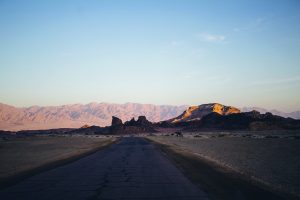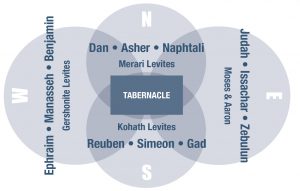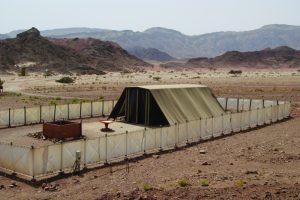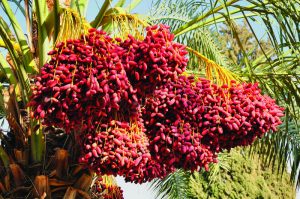×


We have detected your country as:
Please click here to go to the USA website or select another country from the dropdown list.
by: Rev. Rebecca J. Brimmer, International President and CEO

Photo: Michio Nagata/ Bridges for Peace
Do you ever feel like you are in a desert? Deserts and wilderness places are inhospitable. Water is scarce and without water, nothing can live. Perhaps you have been in a situation that seemed overwhelming. Yet, it is at these times that God often speaks. It was in the desert near Horeb that Moses met with God at the burning bush. The angel of God comforted Hagar and Ishmael in the desert. Joseph’s brothers cast him into a pit in the wilderness. Of course, after the Exodus from Egypt, the children of Israel encountered God at Mount Sinai, while on their way to the Promised Land. Imagine—they ended up spending forty years wandering in the desert.
Did you know that there is also a book of the Bible called “In the Desert?” In English we know it as the book of Numbers, but in Hebrew it is called Bamidbar (in the desert). Bamidbar is also the name of a portion of the Torah [Gen.–Deut.] found in Numbers 1:1 – 4:20. The Hebrew title refers to the physical location of the Children of Israel while the English title emphasizes the detailed lists, genealogies and census details found in the book. What can we learn from the sojourn of the Children of Israel in the desert?
The book of Bamidbar (Numbers) starts with God speaking to Moses in the second year after the Exodus from Egypt. These are still early days since the Exodus and Moses is working to form a nation out of a group of tribes. Until very recently the Israelites had been an oppressed group, enslaved by the Egyptians. It is very possible that they felt like they were just numbers in the cog of Egyptian industry.
It must not have been comfortable for the people when God told Moses to take a census. His instructions were: “Take a census of all the congregation of the children of Israel, by their families, by their fathers’ houses, according to the number of names, every male individually, from twenty years old and above—all who are able to go to war in Israel.” (Num. 1:2–3a). There are a lot of qualifiers in that one verse. They were counted by their tribes (families), by their families (fathers’ houses) and by their names (each individually). Later they were counted in four armies (three tribes each). Eventually, the Levites (priests) were counted (all males from one month old and up).
Rabbi Avraham Ariel Trugman, in his book Orchard of Delights, says, “One of the lengthy census’ fundamental messages is that both the nation as a whole and its component parts are exceedingly important and unique. Initially individuals, families and tribes are counted; then another count is recorded of the three tribes encamped on each side of the Tabernacle. Finally a global figure is given for all the tribes. The ever-larger circles of influence, physically demarcated by the encampments, each have their own dynamic, and every individual Jew constantly operates within these various contexts, either consciously or unconsciously. The Torah chose to make ‘the medium the message’ by expressly mentioning each individual, family and tribe in the encampment to reflect the importance the Torah attaches to every component of the nation, as part of the whole and as a distinct part.”
 In God’s economy, each person is meant to be part of a family, a community and a nation. God is the ultimate caring leader and we see that vividly portrayed in Numbers 1, the inter-relatedness of each individual part of the whole nation. Each person is important to God. God knows each one by name. He knows all of us intimately.
In God’s economy, each person is meant to be part of a family, a community and a nation. God is the ultimate caring leader and we see that vividly portrayed in Numbers 1, the inter-relatedness of each individual part of the whole nation. Each person is important to God. God knows each one by name. He knows all of us intimately.
Even though the Lord loves each individual, He always planned that we would be planted and nurtured in a family, and that each family would take their place in an extended family (tribe), and that each individual, family and tribe would responsibly work together for the whole nation (society), and each nation would together be responsible for the care of the earth that God has entrusted to us.
But, in today’s highly mobile world, with so many broken families, it is often difficult for society to function fully in the holistic way that we see modeled here. Rabbi Trugman, says, “So many people feel cut off from their roots, from their societies and from a set of common goals they share with others…Despite the scientific and telecommunications revolutions that have created a ‘global village,’ more individuals than ever feel isolated, confused, jaded and dissatisfied with life.” He goes on, “This [Scripture] portion contains the secret of emotional and spiritual balance, of finding one’s inner equilibrium—in the context of relating to one’s family, society and the very planet as a whole. When we learn to function within all these contexts, we will discover our place in the world and how to relate to our Creator; for ultimately, He placed us here to make the world a better place.”
The Jewish people believe in tikkun olam (repairing the world) which is why they help others in disaster situations all over the world and why Jewish people are at the forefront of helping Christians who are persecuted in the Muslim world. It is the reason they send scientific experts to help solve problems in drought-stricken areas; helping subsistence farmers in Africa to grow enough food for their families to live. That is why they diligently seek for answers to man’s direst medical issues. They do all these things because they understand that they are responsible under God for the well-being not only of themselves, their immediate family, their tribe or their nation, but also the entire human race.
God has not changed. He still knows each of us by name. He still has a plan for us to be plugged into a community. Even if our earthly family does not care for us —He does. He even knows our thoughts.
In 1 Chronicles 28:9 it says, “As for you, my son Solomon, know the God of your father, and serve Him with a loyal heart and with a willing mind; for the Lord searches all hearts and understands all the intent of the thoughts. If you seek Him, He will be found by you; but if you forsake Him, He will cast you off forever.”

Photo: Guillermo Lobo/istock.com
I grew up in the Church. As I reflect on the church of my childhood we definitely understood the importance of being in a community of faith. We fellowshipped together regularly—food was generally involved! We attended services at least three times a week (twice on Sunday and once during the week), because we knew we needed our community of faith. Today, I see this kind of community in some churches but in many others it is missing. Many churches only have one service a week.
In our fast-paced world we have to be intentional about participation in our community. Some people attend huge churches once a week, but are lost in the crowd. Even though they are a part of a church, they may lack a significant community of faith where they are nurtured. Church is not just hearing an inspired sermon and listening to good music. It is also connection with other believers. I encourage you to make it a priority to become involved in smaller groups so that you have people in community with you, so that you can together help each other grow and reach out to others. The internet cannot take the place of a real community. The church is not a building—it is the people of God. As God’s representatives we need to be aware of those who may not be connected, and reach out with God’s love to those who may be in a desert—a dry and thirsty place.
The book of Acts describes the early Church as being connected! “And they continued steadfastly in the apostles’ doctrine and fellowship, in the breaking of bread and in prayers” (Acts 2:42).
Someone said, “don’t sweat the small stuff.” In a way that is correct. We shouldn’t get all upset about things of small import. However, in another way it is not correct. The big picture will be in total disarray if attention is not given to detail. God has given incredible attention to detail. God arranged the desert camp of the Israelites in exquisite detail. Even in this census we see that God cares about the big picture, and every element of which it is composed. Every tribe was counted to the last man!
God told Moses and Aaron to take the census together with a specific leader from each of the twelve tribes (with Ephraim and Manasseh the sons of Joseph). Levi (the priestly tribe) is treated separately later in this account. The names of the leaders are listed in Numbers 1:5–15.
One of the most amazing things about names in the Bible is that most of them have meanings, and often those meanings glorify God!
The first name on the list is Elizur from the tribe of Reuben, which means God is the protector! And the last name on the list is Enan from the tribe of Naphtali, which means “eye.”
The first and last names on the list together recall Deuteronomy 32:10, “He protected them like the pupil of His eye” (Holman Christian Standard Bible).
Let’s look at few of the names of these tribal leaders and their meanings.

Photo: Michio Nagata/ Bridges for Peace
Elizur – God is the protector
Shelumiel – God is my perfection
Nethanel – Gift of God
Eliab – God is my father
Elishama – My God is there
Abidan – Father of judgment
Ahiezer – Brother of assistance
Eliasaph – The Lord increases
Ahira – Brother of iniquity or brother of the shepherd
Just imagine dinnertime in the camp of the Israelis. Mothers all over the camp are calling their children to come home for dinner. Their calls become a cacophony of praise to God. “God is the protector, come home;” “Gift of God, it’s time for dinner.” Everything in the camp reminded them of the God they served. At the center of the entire camp the Tabernacle beckoned. The pillar of fire by night and the cloud by day reassured them of the presence of God on a constant basis.
In Numbers chapters 2 and 3 we find the account of the exact configuration of the camp. The Tabernacle is in the center and on three sides of the Tabernacle the families of the Levites are arranged, with Moses, Aaron and their families on the fourth side. Behind the priestly families and the leadership we find the tribes of Israel, each with their own distinctive banners. Three tribes are on each side of the Tabernacle.
 On the east, which was considered the most important side, facing the Tabernacle, was the leadership (Moses, Aaron). Then three tribes who were all sons of Leah were encamped: Judah, Issachar and Zebulun.
On the east, which was considered the most important side, facing the Tabernacle, was the leadership (Moses, Aaron). Then three tribes who were all sons of Leah were encamped: Judah, Issachar and Zebulun.
On the south, we find the Kohath family of Levites followed by two sons of Leah (Reuben, her first born, Simeon and the son of Leah’s maid Zilpah—Gad)
On the west, we find the Levite family of the Gershonites, followed by three tribes who came from Rachel (Ephraim and Manasseh, the sons of Joseph, and Benjamin).
On the north, which some Jewish authors considered the dark side since Dan later led the northern kingdom in idolatry, we find the Merari family of Levites, followed by the tribes of Dan, Asher and Naphtali (sons of Bilhah and Zilpah the maids of Rachel and Leah).
What incredible attention to detail. It is clear that the twelve tribes are named after the patriarch of their particular tribe. By arranging the tribes according to their matriarchal lineage, God is showing how important women are to Him. Today in the Jewish world tribal identity is still determined by patriarchal lineage, but the matriarchal lineage is what determines that a Jew is a member of the Sons of Israel.
Moses and Aaron camped on the east side of the Tabernacle—facing it (before the Tabernacle). They were to keep watch over the sanctuary. As leaders they were on constant display—always visible to every tribe in the camp. They were looked to for guidance in matters of faith, but also in matters of relationship, law and daily life. They were not distant. They were close to the people who could see their lives of devotion to God on a daily basis.

Photo: Ruk7/wikipedia.org
What an amazing sight the encampment must have been, with the glorious Tabernacle, the center of God’s presence in the midst. No matter which tribe you belonged to, the center of everything was God and His manifest presence in the middle of the camp. You were surrounded by your community; accountable to your family and tribe; and totally connected to your people and your God. The camp did not move until the presence of God, manifested in a cloud by day or a pillar of fire by night, moved. Everything you needed was provided by the God of Israel: manna to eat, clothing that didn’t wear out, leaders to guide the people and laws for living to create a harmonious society.
Life in the Israelite desert camp should have been good. God was leading the way to the Promised Land; He was providing everything that was needed, including godly leadership. Finally the tribes arrived at the borders of their new home. Twelve spies, who were sent to check the place out, came back with a mixed report. The land is wonderful, but already inhabited. Fear overcame the people and they didn’t trust God’s ability to deliver them from their enemies. As a consequence they were doomed to wander in the desert for forty years. Even so, God provided for them in the midst of a trying situation. “For the LORD your God has blessed you in all the work of your hand. He knows your trudging through this great wilderness. These forty years the LORD your God has been with you; you have lacked nothing” (Deut. 2:7).
Today, society has strayed far from God’s plans for the interconnectedness of individual, family, tribe and nation all revolving around God’s house and presence. Worldly wisdom seems to elevate individual desires even over society’s needs. Sometimes the needs of tiny minorities are allowed to jeopardize the safety of much larger portions of society. Our world is fractured because we have not put credence in God’s plans as revealed in His Word.
As believers, we also have been influenced by the world. Today, we need to once again put our entire focus on the God of Israel, the true center of everything. We can trust the God who not only knows each of us intimately, but has also placed us in communities, in families and in nations. All are to work together for the good of His kingdom. No man should be an island. We all must recognize the unique calling of God on our lives, families and communities. We must stand for God under the banner He has placed over us.

Photo: Oleg Zaslavsky/ shutterstock.com
Israel is a semi-arid land with desert and wilderness areas. Many of these places are inhospitable. Every year we hear of hikers getting stranded, sometimes with tragic results. The summer time temperatures in the Jordan Valley soar over 40 degrees Celsius (104 Fahrenheit). I try to avoid all visits during the summer months. My husband, as a tour guide, often leads groups even in the hottest months. He warns the tourists that they must have plenty of water, find shade as often as possible and wear hats. Even so, it is oppressive. Scripture tells us that God has plans even for these desolate places.
In Isaiah, God talks about the return of the Jewish people. “Fear not, for I am with you; I will bring your descendants from the east, and gather you from the west; I will say to the north, ‘Give them up!’ and to the south, ‘Do not keep them back!’ Bring My sons from afar, and My daughters from the ends of the earth” (Isa. 43:5–6). We are living in the days when this Scripture is being fulfilled. Often when I speak about the miracle of the return of the Jewish people, someone will ask me, “If all the Jewish people come to Israel, where we are going to put them?” Later on in this same chapter, we see that God plans to revive the deserts! “Do not remember the former things, nor consider the things of old. Behold, I do a new thing, now it shall spring forth; shall you not know it? I will even make a road in the wilderness and rivers in the desert” (Isa. 43:18–19).
Israel’s first prime minister, David Ben Gurion, had a vision of settling the desert. Today it is happening. Beersheva is growing exponentially. With the advent of desalination plants, Israel is producing drinkable water from the ocean! Today 80% of Israel’s water needs are met by desalination plants. Israel is growing many crops in the desert and wilderness areas utilizing drip irrigation methods developed here.
There are places where fields of flowers are being grown in the desert. Isaiah anticipated this day. “The wilderness and the wasteland shall be glad for them, and the desert shall rejoice and blossom as the rose; it shall blossom abundantly and rejoice, even with joy and singing. The glory of Lebanon shall be given to it, the excellence of Carmel and Sharon. They shall see the glory of the LORD, the excellency of our God…For waters shall burst forth in the wilderness, and streams in the desert. The parched ground shall become a pool, and the thirsty land springs of water…And the ransomed of the LORD shall return, and come to Zion with singing, with everlasting joy on their heads. They shall obtain joy and gladness, and sorrow and sighing shall flee away” (Isa. 35:1–2, 6b–7, 10).
I am anticipating watching God fulfill these “desert” promises, just as He has literally fulfilled so many others.

Photo: kavram/shutterstock.com
In summation, what have we learned from this teaching letter? First, God has a plan for His people; a detailed plan which, if followed, will result in order, blessing, provision and God’s manifest presence. He is a good God who wants to bless His people. Even when we are rebellious, going our own way, He is there, calling us to repentance. When the consequences of our actions land us in desert places, He is still with us. God works in the midst of difficult places. Remember, He provided for the Children of Israel throughout their desert wanderings! He is able to take dry, barren, places and make them fruitful. If you are walking through a “desert place,” I encourage you to put your trust in God. He will never forsake those who turn to Him.
Trugman, Avraham Ariel. Orchard of Delights. Brooklyn: Menucha Publishers, 2011.
All logos and trademarks in this site are property of their respective owner. All other materials are property of Bridges for Peace. Copyright © 2025.
Website Site Design by J-Town Internet Services Ltd. - Based in Jerusalem and Serving the World.